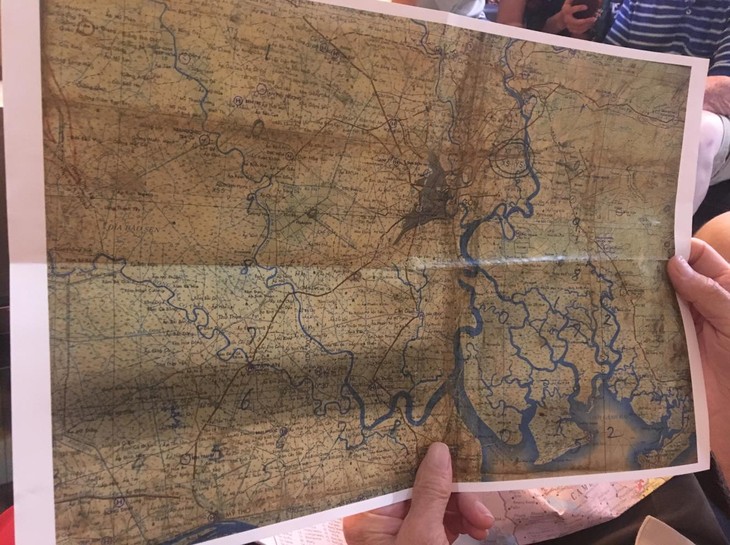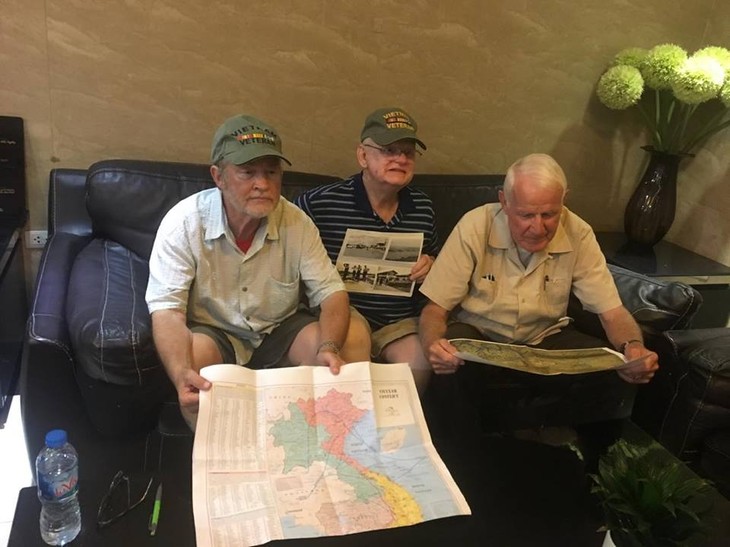(VOVWORLD) - More than 40 years after the end of the Vietnam War, some aging American war veterans have returned to Vietnam to see the country’s progress. VOV interviewed 3 of these men to find out how they view the war today and what they think of the changes in Vietnam.
Leon Charles Thurgood landed in Vietnam for the first time in January 1967, and left one year later. He came back for a second tour of duty from March 1969 to April 1970. He was a unit commander during both tours in combat zones around Chu Lai, Duc Pho, and Tam Ky. Thurgood showed us a 1967 map that he used during the war, and told us the story of how he came to be involved in the Vietnam War.
“I had been in the army for 15 years and the army told me to go to Vietnam, and the second time, the same deal. I got home, I went to school, and then they said 'You go back to Vietnam', so I came back. War is not a good thing for nobody, for all the people, and that’s what we have to do,” Thurgood said.
 Thurgood shows a 1967 map that he used during the war. (Photo: Vietanh/VOV) Thurgood shows a 1967 map that he used during the war. (Photo: Vietanh/VOV) |
Douglas Brent Peterson came to Vietnam when he was 18 years old. He was in the First Infantry Division, serving in Ben Cat and then Quy Nhon and Tam Quan in Binh Dinh province. For Peterson, the worst was when somebody got killed.
"War is terrible. And I think that we need to learn to respect the Vietnamese and understand that they have a family too. They had wives, babies, grandparents, and parents. When I got older, I didn’t think war should be necessary. I think people should sit down and compromise, and work things out. And we can agree or disagree, but it doesn’t mean we have to go kill people,” Peterson said.
When he got back home, Peterson suffered from synalgia with PTSD (post-traumatic stress disorder) and developed a heart problem related to Agent Orange. It was a wake-up call to Peterson to realize that everybody is a human being and today he still feels bad for the fallen Vietnamese soldiers whose bodies never made it home. This is Peterson’s fifth trip to Vietnam. He has several friends in Ho Chi Minh City and Hoi An and is in regular contact with them. He appreciates Vietnam more and more and says it’s been a good experience for him.
“The other things I noticed on my five trips over here is I think the Vietnamese people have mitigated most of the psychological damage and a lot of the environmental damage in this country after we damaged the country a lot with the Agent Orange, all the bombs, everything like that. And I think the country has gone forward and we have a fairly normal relationship with the Vietnamese now. I have a lot of respect for the Vietnamese people now and we have a love for the country,” Peterson said.
Douglas Patrick Millard was an enlisted man whose job was anything related to electronics, including field radios, navigation equipment, and bomb targeting equipment. He served only 6 months in Vietnam from May to November, 1965. He left Vietnam with Agent Orange damage, which eventually caused prostate cancer and diabetes, but he didn’t know that for 20 years. Memories of the Vietnam war have never faded from Millard’s mind.
“I was scared to death when they said 'Come on, leave, you’re going to Vietnam'. I thought 'Oh, no. This is where I die'. Only what I saw on the news on TV, yeah, and I could see it was a bad war for both sides. Let me say that I’m very happy that today all over the country are friends. We’re friends. I think it’s wonderful. I can go into a store in the United States and I can find a beautiful shirt and it’s made in Vietnam. This is good,” he said.
 From left to right: Douglas Brent Peterson, Douglas Patrick Millard, and Leon Charles Thurgood (Photo:Vietanh/VOV) From left to right: Douglas Brent Peterson, Douglas Patrick Millard, and Leon Charles Thurgood (Photo:Vietanh/VOV) |
Thurgood, Peterson, and Millard - served in different divisions, and had different memories of the war, but they seem to share the same conviction that they weren’t going to let the war ruin their life. When Millard was diagnosed with his diseases, the US Veterans Administration agreed to pay him money, so, he says, it has not been a total disaster for him, although he didn’t plan it that way. Peterson came home, went to college, got a good job, got married, and had three kids. Thurgood came back to the US and became a financial advisor. Vietnam is no longer their enemy, but their friend.
- “It’s my second time back in Vietnam as a civilian. I just wanted to come back to see what’s going on, what progress Vietnam has made. I like Vietnam, I like the people, too.”
- “I love Vietnam and I always had very good experiences here. And I asked everybody over here, “Don’t you hate Americans for what we did? There’s no hate there. They said there’s nothing we can do about what happened yesterday, we just go forward. This is an absolutely beautiful country and I love the people. And I think maybe the best thing would be the people. The people would probably be the number one reason I feel so good about Vietnam.”